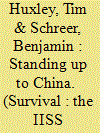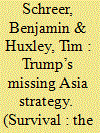|
|
|
Sort Order |
|
|
|
Items / Page
|
|
|
|
|
|
|
| Srl | Item |
| 1 |
ID:
035379


|
|
|
|
|
| Publication |
Canberra, Australian National University, 1981.
|
| Description |
12p.
|
| Series |
Strategic and defence studies centre working paper
|
| Standard Number |
0867845503
|
|
|
|
|
|
|
|
|
|
|
|
Copies: C:1/I:0,R:0,Q:0
Circulation
| Accession# | Call# | Current Location | Status | Policy | Location |
| 025312 | 355.033559/HUX 025312 | Main | On Shelf | General | |
|
|
|
|
| 2 |
ID:
061590


|
|
|
|
|
| Publication |
London, Frank Cass & Co, 1989.
|
| Description |
ix, 198p.
|
| Standard Number |
0714633100
|
|
|
|
|
|
|
|
|
|
|
|
Copies: C:1/I:0,R:0,Q:0
Circulation
| Accession# | Call# | Current Location | Status | Policy | Location |
| 039448 | 355.82/BEL 039448 | Main | On Shelf | General | |
|
|
|
|
| 3 |
ID:
146357


|
|
|
|
|
| Summary/Abstract |
During the course of 2015, China used land-reclamation techniques to expand many of the features that it occupies in the South China Sea, most of which were then militarised. This development – alongside many other important signs of assertiveness, including China’s large-scale naval modernisation; its expanding deployment of maritime paramilitary forces to coerce other Asian states, including Japan, in the East China Sea; its efforts to undermine the unity of the Association of Southeast Asian Nations (ASEAN); and its attempted creation of an alternative regional security architecture – not only indicated Beijing’s intent to reinforce its maritime claims, but also highlighted China’s drive to create a new regional order in which it plays a dominant and arbitrating role. Such an order could only undermine the interests of other regional states and the West. While the success of these efforts is by no means inevitable, the United States and its regional allies and security partners will need to respond more firmly to China, particularly in the South China Sea (SCS). By late October 2015, an initial ‘freedom of navigation’ patrol by the US Navy, which took one of its ships inside the 12-nautical-mile territorial waters claimed by China around one of the features that it occupies in the SCS, indicated that Washington recognised the necessity of stronger countermeasures. However, to succeed, this tougher approach will need to be both persistent and supported by US allies and security partners in the region and beyond.
|
|
|
|
|
|
|
|
|
|
|
|
|
|
|
|
| 4 |
ID:
153359


|
|
|
|
|
| Summary/Abstract |
The Trump administration needs an Asia strategy that will reassure its allies and partners there about Washington’s capacity, competence and resolve to retain its position of leadership in the region. Despite early visits by Vice President Mike Pence, Secretary of State Rex Tillerson and Defense Secretary James Mattis to reaffirm America’s ‘ironclad’ commitment to allies such as Japan and South Korea, mixed messaging and Donald Trump’s ‘America First’ doctrine – which apparently remains the administration’s default strategic concept – have continued to generate scepticism and anxiety.
|
|
|
|
|
|
|
|
|
|
|
|
|
|
|
|
| 5 |
ID:
060774


|
|
|
|
|
| Publication |
2005.
|
| Description |
p123-132
|
| Summary/Abstract |
Despite its huge human cost and notwithstanding the recent panglossian predictions of some observers of Asian politics and international relations, the tsunami disaster has not affected the security outlooks of even the most severely affected states in any fundamental way. The tsunami's huge human toll should encourage South and Southeast Asian states and their regional groupings to pay greater attention to human security issues. But deep-rooted ways of looking at security and embedded inter-state rivalry suggest that security priorities and policies of regional states are no more likely to undergo sea-change than those of the industrial states which continue to dominate the region militarily.
|
|
|
|
|
|
|
|
|
|
|
|
|
|
|
|
|
|
|
|
|